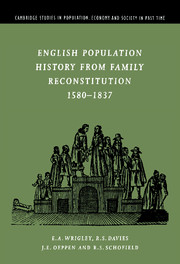5 - Nuptiality
Published online by Cambridge University Press: 07 September 2010
Summary
All beings that enter life must later leave it. Between birth and death some, but not all, will play a part in ensuring that, though they may die, their species will continue. In some animal species only a tiny fraction of each new generation plays a part in engendering its successor because so few survive the early perils of life and become sexually mature. Even in the unhealthiest environment, however, the erosion of each new generation by death is relatively mild in the case of man. Even where expectation of life at birth is as low as 20 years, for example, about a third of new-born children will survive to the age of 25 years. To survive to maturity, however, is not always enough to ensure an opportunity to reproduce even when the man or woman in question is well able to do so physiologically. It may also be necessary to marry. Reproduction outside marriage occurred in all societies, but in many it was rare and might involve punishment for one or both parents and serious disabilities for the child. If marriage was not a sine qua non for reproduction, therefore, it was often almost so.
In most societies, restricting reproduction very largely to those who were married did not exclude many young men and women from the opportunity to reproduce since almost all who reached maturity without marked physical or mental handicaps were assured of marrying, but parts of western Europe formed an exception to this rule since there a substantial proportion of each rising generation never married, often more than 10 per cent, sometimes as much as 25 per cent.
- Type
- Chapter
- Information
- English Population History from Family Reconstitution 1580–1837 , pp. 121 - 197Publisher: Cambridge University PressPrint publication year: 1997

